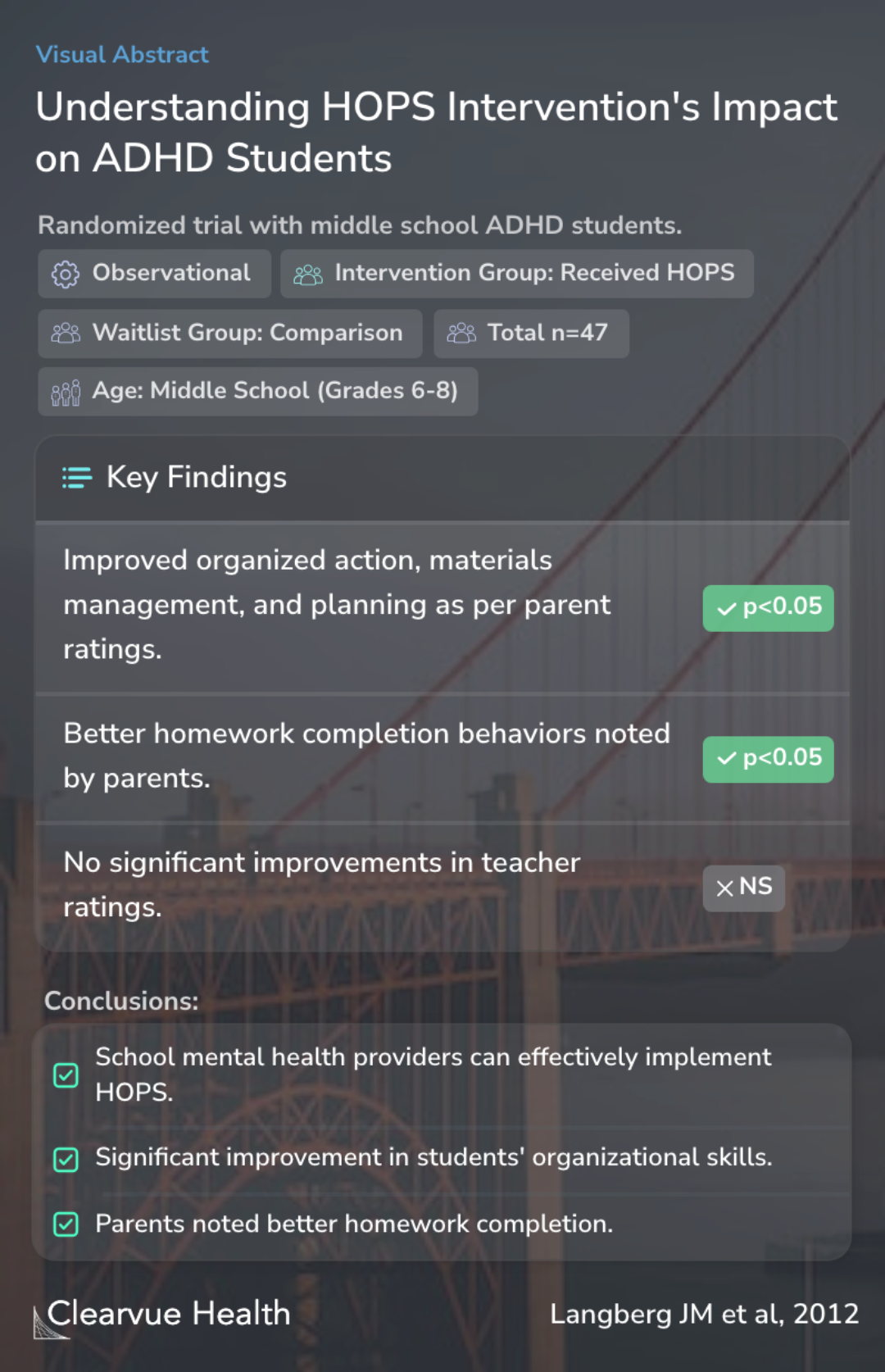Evaluating HOPS Intervention for ADHD in Middle School Students
A Trial of Homework and Organization Therapy for ADHD Students
Langberg JM, Epstein JN, Becker SP, Girio-Herrera E, Vaughn AJ

Objectives
The study focused on evaluating the Homework, Organization, and Planning Skills (HOPS) intervention, particularly for middle school students with Attention-Deficit/Hyperactivity Disorder (ADHD). This evaluation was done by school mental health (SMH) providers using a randomized trial design. The aim was to assess if HOPS could really help these students in a real-world school setting.
The purpose of the study was to evaluate the Homework, Organization, and Planning Skills (HOPS) intervention for middle school students with Attention-Deficit/Hyperactivity Disorder (ADHD) as implemented by school mental health (SMH) providers using a randomized trial design.
Methods
Seventeen SMH providers across five school districts took on the task of implementing the HOPS intervention. The study involved 47 middle school students with ADHD, spanning grades 6-8. These students were randomly placed into two groups: one group received the HOPS intervention, and the other served as a waitlist comparison group. The study's approach was thorough, gathering feedback on the students' organizational skills and homework problems from both parents and teachers, before and after the intervention, and then again three months later. School grades of these students were also tracked to measure the intervention's impact.
Seventeen SMH providers from five school districts implemented the HOPS intervention. Forty-seven middle school students with ADHD (grades 6-8) were randomly assigned to receive the HOPS intervention or to a waitlist comparison group. Parent and teacher ratings of organizational skills a...
Results
Parents of students who participated in the intervention noticed significant improvements. They reported better-organized actions, improved materials management, and enhanced planning skills in their children. Additionally, these students showed better homework completion behaviors. These improvements were statistically significant, meaning the HOPS intervention likely caused them. However, the teachers did not report similar improvements, indicating a discrepancy between parent and teacher observations.
Intervention participants demonstrated significant improvements relative to the waitlist comparison across parent-rated organized action (d = .88), materials management (d = .63), planning (d = 1.05), and homework completion behaviors (d = .85). Intervention participants did not make sig...
Conclusions
In conclusion, the HOPS intervention, as implemented by SMH providers, successfully enhanced organizational skills and homework completion in students with ADHD, according to parent ratings. Remarkably, these results were achieved without the need for formal ongoing consultation. This aligns with other studies suggesting that interventions focusing on organization can be beneficial for students with ADHD.
SMH providers were able to implement the HOPS intervention with fidelity despite the fact that no formal ongoing consultation was provided.
Key Takeaways
Context
To understand this study's place in the broader research landscape, it's helpful to look at similar studies. For instance, a 2013 study by Langberg et al. found that students using the HOPS binder system showed major improvements in organization, planning, and homework management skills.
Another significant study, a 2017 meta-analysis by Bikic et al., found that Organizational Skills Training (OST) significantly improved organizational skills, attention, and academic performance in children with ADHD. These studies, along with the current one, emphasize the potential of structured interventions like HOPS in aiding students with ADHD in their academic and organizational tasks.